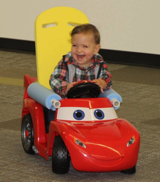September 9, 2024 The collaboration, including researchers from the UW Department of Rehabilitation, the UW iSchool, and the University of Pittsburgh, is funded by a 5-year, $3.2 million NIH R01 grant — the first funding of its kind from the NIH to support ableism and health disparity research. “The long-term goal of this work is to reduce disparities and maximize participation, health, and quality of life in partnership with people with mobility disabilities. This work will leverage our team’s multidisciplinary…
Category: Heather Feldner news articles
Off to the Park: A Geospatial Investigation of Adapted Ride-on Car Usage
November 7, 2023 Adapted ride-on cars (ROC) are an affordable, power mobility training tool for young children with disabilities. But weather and adequate drive space create barriers to families’ adoption of their ROC. CREATE Ph.D. student Mia E. Hoffman is the lead author on a paper that investigates the relationship between the built environment and ROC usage. With her co-advisors Kat Steele and Heather A. Feldner, Jon E. Froehlich (all three CREATE associate directors), and Kyle N. Winfree as co-authors,…
CREATE + I-LABS: focus on access, mobility, and the brain

A new research and innovation partnership between CREATE and the UW Institute of Learning and Brain Sciences (I-LABS) focuses on access, mobility, and the brain, especially how early experiences with mobility technology impact brain development and learning outcomes.
Heather Feldner ‘wrote the book’ on power mobility device for babies
CREATE Associate Director Heather Feldner has authored two guidebooks, instructing caregivers, researchers and clinicians how to introduce Permobil’s Explorer Mini to young children between the ages of 12 and 36 months. Permobil’s Explorer Mini is a new, lightweight, joystick-operated powered mobility device that provides opportunities for mobility, exploration, and play for children with disabilities at ages and stages that are more equitable compared to their peers without disabilities. Feldner and her co-authors have synthesized their own work and work from pioneers in the field, describing the benefits and impact of on-time access…
Feldner and Harniss receive research poster award for work on allyship training in rehabilitation education
Heather Feldner and Mark Harniss team received a blue ribbon award as one of the top 3 posters for Social Responsibility at an American Physical Therapy Association meeting.
Feldner and Steele’s ‘Reimagining Mobility’ series featured in The Daily
November 17, 2021 Collaboration and diverse perspectives and approaches are at the heart of CREATE’s mission to make technology accessible and make the world accessible though technology. One program developed by CREATE faculty looks at mobility solutions and ways to eliminate barriers. Hosted by CREATE associate directors Kat Steele and Heather Feldner, the Reimagining Mobility Conversation Hub brings in speakers from a variety of backgrounds and industries to inspire conversations about the future of mobility. The UW student newspaper, The…
Go Baby Go Car Adaptation Workshop
UW Go Baby Go, co-directed by CREATE Associate Director Heather Feldner, is excited to announce its fall workshop where we will build ten Go Baby Go cars for local children with disabilities and their families! UW and CREATE students, postdocs, and faculty (especially from engineering, computer science, and rehab programs), local clinicians, and parents/caregivers are all encouraged to attend. Saturday, November 6, 2021 * Workshop: 8:30 a.m.-2 p.m. * Family car fittings and pickup: 2-4 p.m. UW Rehab Medicine, BB tower…
$1M NIDILRR award for leadership training program
A team of CREATE faculty has received a five-year, $1M grant from the National Institute on Disability, Independent Living, and Rehabilitation Research (NIDILRR) for the project, “ARRT: Postdoctoral Training in Physical Computing and Fabrication to Support Innovations for Community Living and Participation.” Congratulations on the funding to the team members: Co-PI Jennifer Mankoff, Ph.D and Professor Paul G. Allen School of Computer Science and Engineering Co-PI Anat Caspi, Ph.D. and Principal, Paul G. Allen School of Computer Science & Engineering…
Feldner team receives grant to study pediatric mobility technology
October 20, 2020 The team, one of only three selected across the country, includes Sam Logan, an associate professor at Oregon State University, and Lisa Kenyon, a professor at Grand Valley State University. Study Details: The use of powered mobility devices for young children with cerebral palsy (CP) has been gaining traction. Evidence shows that the use of powered mobility at young ages complements (rather than detracts from) other interventions focused on more traditionally viewed mobility skills such as crawling…
AccessComputing shares UW CREATE’s launch and work toward accessibility
CREATE faculty are already internationally recognized for their contributions to assistive technology and accessible computing; by bringing them together under one organizational roof, CREATE will enable synergies and foster collaborations that enable faculty and students to become more than the sum of their parts.
UW Disability Studies, D Center win UW Medicine CLIME Grant
UW faculty and staff affiliated with CREATE, UW Disability Studies and the UW D Center have received a grant from the Center for Leadership and Innovation in Medical Education (CLIME) to explore what it means to be an ally to people with disabilities. “This is an integral issue informing professional education in the medical fields as well as in design and engineering, says PI Heather Feldner. “I am most excited that this project has the potential to further the conversation about how an…